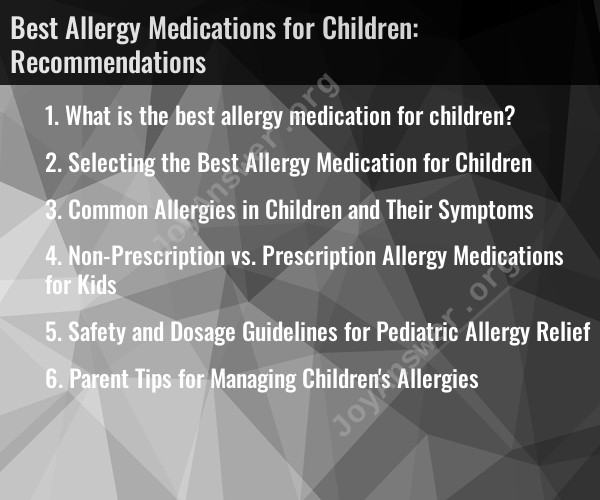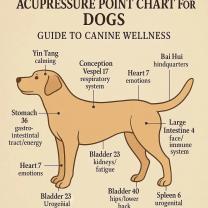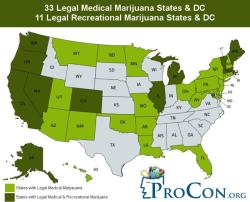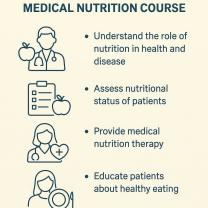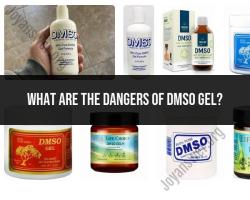What is the best allergy medication for children?
The best allergy medication for children can depend on the specific allergies and symptoms they are experiencing, as well as their age and other individual factors. It's essential to consult with a healthcare professional, such as a pediatrician or allergist, before giving any medication to a child, as they can provide guidance tailored to the child's needs. However, here are some common allergy medications for children:
Antihistamines:
- Cetirizine (Zyrtec): Cetirizine is often used for children and is available in both liquid and chewable tablet forms.
- Loratadine (Claritin): Loratadine is available in various forms, including syrup and chewable tablets.
- Fexofenadine (Allegra): Fexofenadine is approved for children six years and older.
Nasal Steroids:
- Fluticasone (Flonase Allergy Relief): Fluticasone is approved for children over the age of four. It can be effective for nasal allergies and hay fever.
Eye Drops:
- Ketotifen (Zaditor): Ketotifen eye drops are used to relieve itchy, watery eyes caused by allergies and are often suitable for children.
Decongestants:
- Decongestants like pseudoephedrine (Sudafed) may be used in some cases, but they are generally not recommended for young children, and you should consult a healthcare professional before using them.
Combination Medications:
- Some medications, like Claritin-D, combine an antihistamine with a decongestant. These should be used with caution in children and under the guidance of a healthcare professional.
It's important to follow the dosing instructions provided on the medication's packaging or as advised by the child's healthcare provider. Additionally, you should be aware of any potential side effects and drug interactions. Always consult with a healthcare professional before starting any new medication for a child, and inform them about any other medications the child may be taking.
Keep in mind that allergies in children can vary in severity and type, so the best medication may differ from one child to another. Also, consider non-pharmacological measures, such as allergen avoidance, as part of the overall allergy management plan. If your child's allergies are severe or not responding to over-the-counter medications, your healthcare provider may recommend prescription medications or other treatment options.
Selecting the Best Allergy Medication for Children
Choosing the right allergy medication for children can be a daunting task for parents, given the variety of options available and the need to ensure safety and effectiveness. Here's a guide to help you make an informed decision:
Factors to Consider:
Child's Age and Weight: Medications are typically formulated for specific age groups and weight ranges. Follow the dosage instructions carefully to avoid potential side effects.
Type of Allergy: Different allergy medications target specific symptoms. For example, antihistamines are effective for runny nose, sneezing, and itchy eyes, while decongestants help clear a stuffy nose.
Severity of Symptoms: For mild allergies, over-the-counter (OTC) medications may be sufficient. For more severe or persistent allergies, prescription medications may be necessary.
Potential Side Effects: Some allergy medications can cause drowsiness or other side effects. Consult your child's doctor before administering any medication.
Common OTC Allergy Medications for Children:
Antihistamines: Cetirizine (Zyrtec), loratadine (Claritin), fexofenadine (Allegra)
Decongestants: Pseudoephedrine (Sudafed), phenylephrine (Sudafed PE)
Prescription Allergy Medications for Children:
Nasal corticosteroids: Fluticasone (Flonase), mometasone (Nasonex)
Oral steroids: Prednisone, methylprednisolone
Consulting a Healthcare Professional:
It's always advisable to consult with your child's pediatrician or an allergist to determine the best allergy medication for your child's specific needs. They can assess your child's overall health, allergy severity, and potential medication interactions.
Common Allergies in Children and Their Symptoms
Allergies are a common childhood condition, affecting around 40% of children in the United States. Here are some of the most common allergies in children and their associated symptoms:
Pollen Allergies (Seasonal Allergies): Runny nose, sneezing, itchy eyes, watery eyes, congestion
Food Allergies: Skin rash, hives, swelling of the face, lips, tongue, or throat, difficulty breathing, abdominal cramps, nausea, vomiting
Dust Mite Allergies: Runny nose, sneezing, itchy eyes, watery eyes, congestion, sinus pressure, coughing, postnasal drip, eczema
Pet Allergies: Runny nose, sneezing, itchy eyes, watery eyes, congestion, sinus pressure, coughing, postnasal drip, skin rash, hives
Mold Allergies: Runny nose, sneezing, itchy eyes, watery eyes, congestion, sinus pressure, coughing, postnasal drip, skin rash, hives
If your child experiences any of these symptoms, it's important to consult a healthcare professional to determine the cause and develop a proper treatment plan.
Non-Prescription vs. Prescription Allergy Medications for Kids
Over-the-counter (OTC) allergy medications are readily available without a prescription and are generally safe for most children. They can provide effective relief for mild to moderate allergy symptoms. However, some OTC medications may cause drowsiness or other side effects.
Prescription allergy medications are stronger and may be necessary for severe or persistent allergies. They often require a prescription from a healthcare professional, who can monitor your child's response to the medication and adjust the dosage as needed.
Safety and Dosage Guidelines for Pediatric Allergy Relief
When administering allergy medications to children, it's crucial to follow safety and dosage guidelines carefully. Here are some key points to remember:
Read medication labels carefully: Always read the product label thoroughly and follow the dosage instructions specifically for your child's age and weight.
Use the provided measuring device: Use the measuring device provided with the medication to ensure accurate dosage.
Avoid double dosing: Do not administer more than the recommended dosage, even if your child's symptoms persist. Overdosing can lead to serious side effects.
Seek professional advice for any concerns: If you have any questions or concerns about administering allergy medications to your child, consult your child's doctor or pharmacist.
Parent Tips for Managing Children's Allergies
In addition to medication, there are several strategies parents can implement to manage their child's allergies and reduce their exposure to allergens:
Identify and Avoid Triggers: Determine the specific allergens that trigger your child's symptoms and take steps to avoid them as much as possible. This may involve keeping windows closed during pollen seasons, removing pets from the house, or avoiding certain foods.
Wash Hands Often: Encourage frequent handwashing to prevent the spread of allergens and reduce the risk of infection.
Keep the Home Allergen-Free: Regularly clean and vacuum surfaces to remove dust mites, pet dander, and other allergens. Use high-efficiency air
